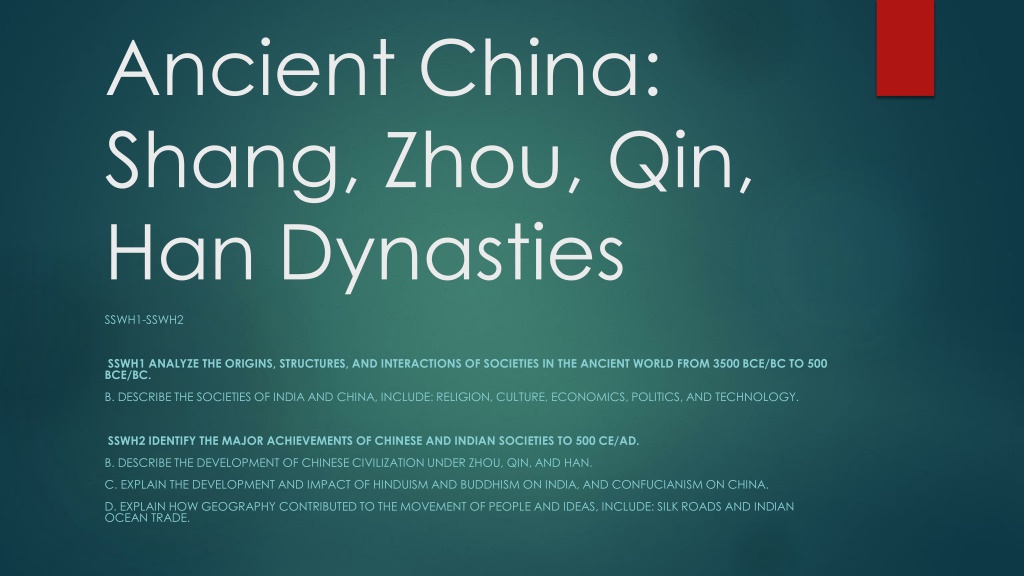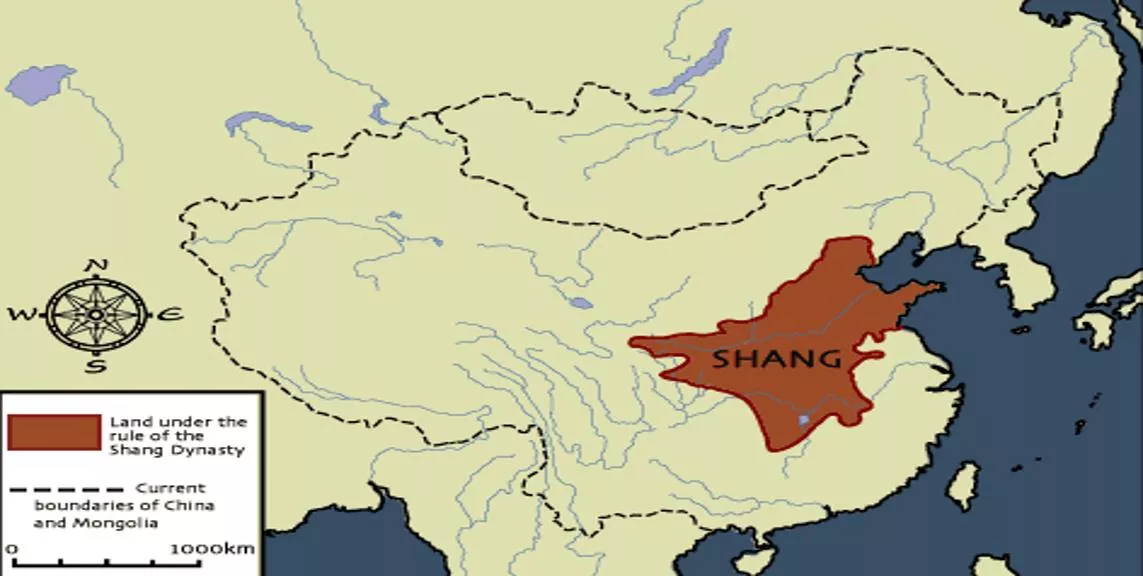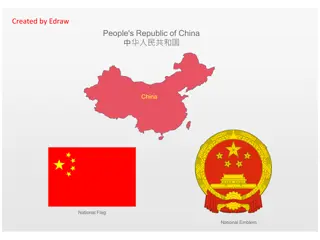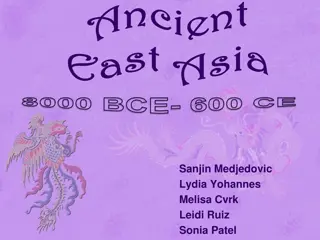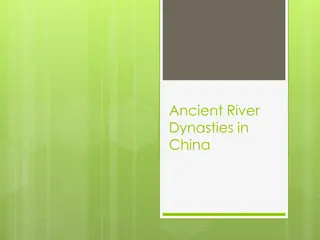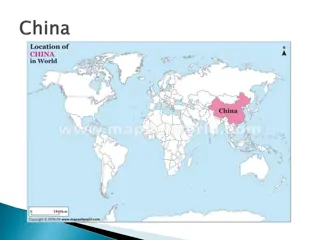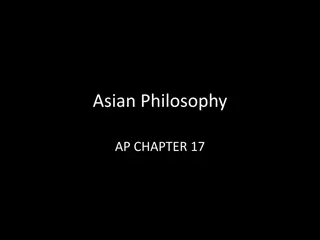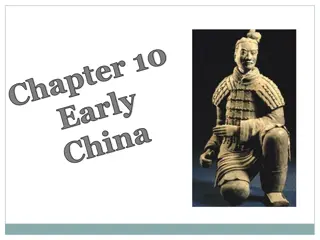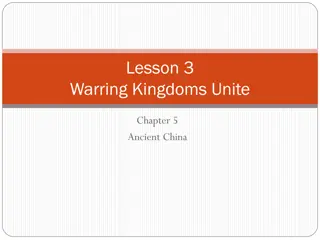Ancient China: Societies, Philosophies, and Dynasties
Ancient China's history is rich with the Shang, Zhou, Qin, and Han Dynasties shaping society. Various philosophies like Confucianism, Daoism, and Legalism influenced politics and culture. The Mandate of Heaven concept emphasized good governance. China's geographic location facilitated trade, notably via the Silk Road. Key achievements include technologies like acupuncture and expansive construction projects like the Great Wall. Overall, Chinese civilization's development under different dynasties and belief systems offers a fascinating insight into ancient societies.
Download Presentation

Please find below an Image/Link to download the presentation.
The content on the website is provided AS IS for your information and personal use only. It may not be sold, licensed, or shared on other websites without obtaining consent from the author. Download presentation by click this link. If you encounter any issues during the download, it is possible that the publisher has removed the file from their server.
E N D
Presentation Transcript
Ancient China: Shang, Zhou, Qin, Han Dynasties SSWH1-SSWH2 SSWH1 ANALYZE THE ORIGINS, STRUCTURES, AND INTERACTIONS OF SOCIETIES IN THE ANCIENT WORLD FROM 3500 BCE/BC TO 500 BCE/BC. B. DESCRIBE THE SOCIETIES OF INDIA AND CHINA, INCLUDE: RELIGION, CULTURE, ECONOMICS, POLITICS, AND TECHNOLOGY. SSWH2 IDENTIFY THE MAJOR ACHIEVEMENTS OF CHINESE AND INDIAN SOCIETIES TO 500 CE/AD. B. DESCRIBE THE DEVELOPMENT OF CHINESE CIVILIZATION UNDER ZHOU, QIN, AND HAN. C. EXPLAIN THE DEVELOPMENT AND IMPACT OF HINDUISM AND BUDDHISM ON INDIA, AND CONFUCIANISM ON CHINA. D. EXPLAIN HOW GEOGRAPHY CONTRIBUTED TO THE MOVEMENT OF PEOPLE AND IDEAS, INCLUDE: SILK ROADS AND INDIAN OCEAN TRADE.
Vocabulary Mandate of Heaven - the Chinese belief that the gods picked the emperor to rule but the gods could also remove a bad emperor from power. Confucianism - a philosophy that was concerned with ensuring social order and good government Daoism - a philosophy that stressed the importance of nature. By living naturally, harmony could be achieved Legalism - People are evil in nature, strict laws and violent punishments are needed to keep order Wudi - A Han Dynasty emperor who set up grain reserves throughout the empire to control prices during supply and demand changes Shi Huangdi - A Qin Dynasty emperor who ordered the construction of the Great wall of China Acupuncture - Acupuncture is the practice of inserting needles into the skin to cure disease or relieve pain. This practice is still widely used today. The Silk Road - A Trade route that extends from China to Rome that goods and ideas are transferred along
The first known dynasty of China was the Shang dynasty. This dynasty united the people living around the Huang He and Yangtze river valleys.
The Zhou dynasty lasted longer than any other Chinese dynasty.
The Zhou Dynasty Around 1027 B.C., the Zhou conquered the Shang. The Zhou dynasty lasted longer than any other Chinese dynasty. It lasted from 1027 B.C. to 221 B.C. Zhou rulers claimed the right to rule or the Mandate of Heaven.
Mandate of Heaven The Mandate of Heaven was the Chinese belief that the gods picked the emperor to rule but the gods could also remove a bad emperor from power. The Mandate of Heaven can be viewed as the right to rule. The ruler kept the Mandate of Heaven for as long as he ruled effectively. The Zhou Dynasty was the first Chinese Dynasty to use the Mandate Of Heaven
Philosophies and Religions of China 1. Confucianism Founded by Confucius He stressed the importance of order to achieve harmony. Confucius believed that if people knew and did what they should do, then harmony would occur. Rulers relied on the ideas of Confucianism Confucius developed a philosophy that was concerned with ensuring social order and good government 2. Legalism Official Qin Dynasty policy People are evil in nature, strict laws and violent punishments are needed to keep order Feudal rulers used legalism to keep order
Philosophies and Religion Continued 3. Daoism Founder is Lao Tzu Daoism was a philosophy that stressed the importance of nature. By living naturally, harmony could be achieved. A religion that rejected conflict Emphasized flexibility and yielding Daoist priests contributed to science and medicine 4. Buddhism Founder is Siddhartha Gautama -Key Beliefs Escape Suffering & promise of personal salvation -According to Buddhism, the goal of Buddhism is to reach enlightenment through meditation. Buddhist belief of union with the universe and release from the cycle of rebirth is known as nirvana. Factor that helped Buddhism spread through China is Mahayana Buddhism offered escape from suffering and the promise of achieving salvation.
Qin Dynasty Shi Huangdi conquered the Zhou Dynasty and abolished feudalism The Qin ruler was the first Chinese ruler to call himself emperor. Shi Huangdi was a harsh but strong ruler. He introduced a uniform system of writing. The Chinese were forced to obey his rules. He ordered the execution of people who disagreed with him. Shi Huangdi promoted unity, repaired/extended roads, and standardized writing, measurements, and coins.
Under the rule of Shi Huangdi During Qin Dynasty, the Chinese began building the Great Wall of China. The Great Wall of China was built to protect China from nomadic invaders.
The Han Dynasty The Big Idea The Han dynasty created a new form of government that valued family, art, and learning. Main Ideas Han dynasty government was based on the ideas of Confucius. Family life was supported and strengthened in Han China. The Han made many achievements in art, literature, and learning.
Emperor Lui Bang of the Han Dynasty Liu Bang, a peasant fighting in a rebel army, became emperor due to the Chinese belief in the mandate of heaven. He was the first emperor of the Han dynasty. Well liked by both warriors and peasants, Liu Bang released the country from strict Legalistic practices and focused on people s immediate needs. Liu Bang lowered taxes, gave large plots of land to supporters, and set up a government that expanded on the ideas of the Qin
Emperor Wudi of the Han Dynasty In 140 BC, Emperor Wudi took the throne and shifted the country s focus back to a strong central government. Confucianism became the official government philosophy. Wudi built a university that taught Confucian ideals, and awarded his officials with higher rank if they were familiar with Confucian principles. Emperor Wudi set up grain reserves throughout the empire to control prices during supply and demand changes.
Traveling the Silk Road Traders brought Chinese ideas and goods to the West and Western ideas and goods to China To the West from China To China From the West Silk Ivory Porcelain Gold Magnetic compass Music Gunpowder Astronomy Papermaking Mathematics Printmaking Buddhism Confucianism Islam
Cultural Achievements Calendar Sun dial - A device for telling time, the sundial uses the position of the shadows cast by the sun to tell the time of day. Acupuncture - Acupuncture is the practice of inserting needles into the skin to cure disease or relieve pain. This practice is still widely used today. Seismograph - This device measures the strength of an earthquake. Chinese scientists believed that the movement of the earth was a sign of evil times.
